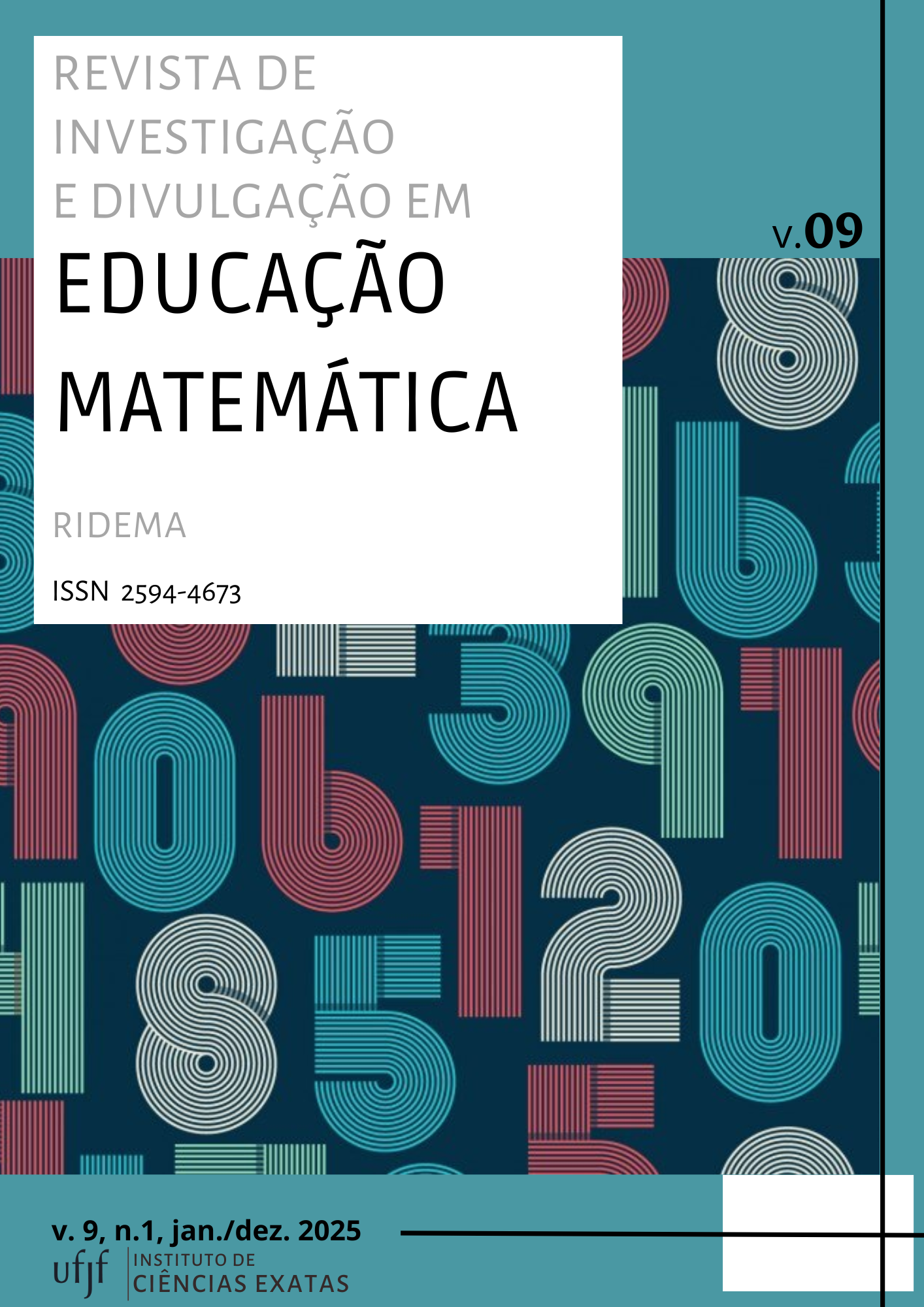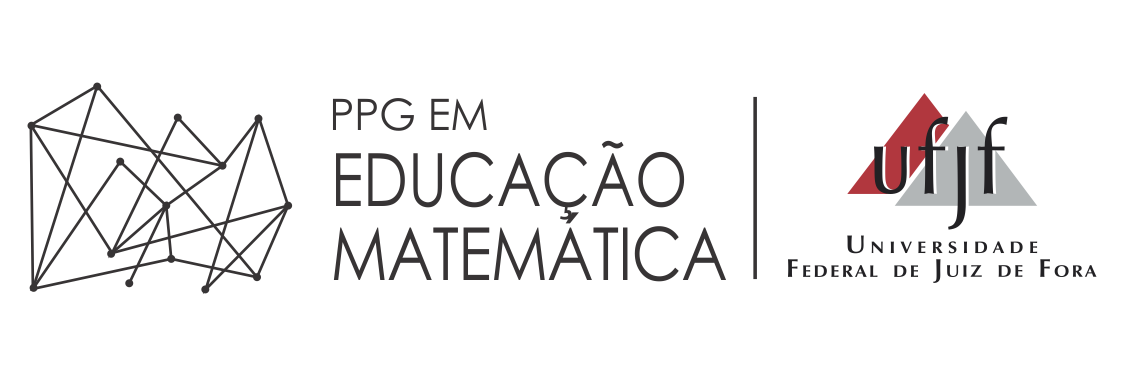O raciocínio proporcional: a 'pedra de topo' na formação de professores dos anos iniciais
Keywords:
Proportional reasoning; Proportionality; Teacher education; Early years; Problem Solving.Abstract
This article is the result of an Academic Master’s research of a qualitative and descriptive nature, which aimed to investigate teachers' knowledge of proportional reasoning and the potential of the Teaching-Learning-Assessment Methodology of Mathematics through Problem Solving (MEAAMaRP) in the continuing education of teachers working in the early years of Elementary Education. The central question guiding the research was: “How do teachers engage in an investigation of proportional reasoning using MEAAMaRP, and what does this reveal about their knowledge and abilities?” As part of this study, the article seeks to verify whether these teachers were able to differentiate additive thinking from multiplicative thinking in a problem-solving situation that generated the concepts of ratio and proportion. This work proposes to: gather materials to construct, organize, raise, and build proportional reasoning through research, data collection, and analysis. More than constructing it, the goal is to reflect on it in the context of teacher education. Despite the challenges in distinguishing additive thinking from multiplicative thinking through a problem that generates the concept of proportional reasoning, the teachers engaged with the methodological teaching-learning model in the classroom using MEAAMaRP. They were inspired by the desire to use the problem as a starting point and to challenge their students in this work with Problem Solving.
Downloads
Metrics
References
ALLEVATO, N. S. G.; ONUCHIC, L. de la R. Ensino-Aprendizagem-Avaliação de Matemática: por que Através da Resolução de Problemas? In: ONUCHIC, L. de la R.; ALLEVATO, N. S. G.; NOGUTI, F. C. H.; JUSTULIN, A. M. (Org.). Resolução de Problemas: teoria e prática. Jundiaí: Paco, 2021, p. 40-62.
BOGDAN, R.; BIKLEN, S. Investigação Qualitativa em Educação: uma introdução à teoria e aos métodos. Porto: Porto Editora, 1994.
BRASIL. Ministério da Educação. Secretaria de Educação Básica. Base Nacional Comum Curricular: Educação Infantil e Ensino Fundamental. Brasília: MEC/SEB, 2018.
BRASIL. Secretaria de Educação Fundamental. Parâmetros Curriculares Nacionais: Matemática. Brasília: MEC / SEF, 1998. 148p.
CONSTRUIR. In: MICHAELIS Moderno Dicionário da Língua Portuguesa. São Paulo: Melhoramentos. Disponível em: <https://michaelis.uol.com.br/busca?id=oLwX>. Acesso em: 01 out. 2022.
COSTA, M.S. Ensino-aprendizagem-avaliação de proporcionalidade através da resolução de problemas: uma experiência na formação inicial de (futuros) professores de Matemática. 2012. 292 p.: Tese (Doutorado em Ensino de Ciências e Matemática) - Universidade Cruzeiro do Sul, 2012.
COSTA, S. C. H. C. O raciocínio proporcional dos alunos do 2º ciclo do ensino básico. 2007. Dissertação (Mestrado) - Universidade de Lisboa. Faculdade de Ciências. Departamento de Educação. Especialidade de Didáctica da Matemática, 2007.
CRAMER, K.; POST, T.; CURRIER, S. Learning and Teaching ratio and proportion: research implications. In: OWENS, D.T. (Ed.) Research ideas for the classroom: middle grades mathematics. New York: Macmillan, 1993. p. 159-178.
FALVO, S. R.; JUCÁ, R. S. O raciocínio proporcional através da resolução de problemas: uma experiência de formação com professores que atuam nos Anos Iniciais. Revista com a palavra, o professor. Vitória da Conquista (BA), v. 7, n.1 8, p. 135-152, maio/ago. 2022. Disponível em: http://revista.geem.mat.br/index.php/CPP/issue/view/39 Acesso em: 22 out. 2024.
FALVO. S. R.; A ‘Pedra de Topo’ e a Metodologia de Ensino-Aprendizagem-Avaliação de Matemática através da Resolução de Problemas: Instrumentos de Formação Continuada para Professores dos Anos Iniciais do Ensino Fundamental. Rio Claro, 2023. 140 p. Dissertação (Mestrado) - Instituto de Geociências e Ciências Exatas, Universidade Estadual Paulista (UNESP), 2023.
KIEREN, T. E. The rational number construct – its elements and mechanisms. In: KIEREN, T. E., (ed.) Recent Research on Number Learning. Columbus: Eric/Smeac, 1980, p.125- 150.
LAMON, S. J. Teaching fractions and ratios for understanding (2nd ed). Mahwah: Lawrence Erlbaum Associates, 2005.
LAMON, S. Teaching fractions and ratios for understanding: essential content knowledge and instructional strategies for teachers. 3thed. New York: Routledge, 2012.
LESH, R., POST, T., BEHR, M. Proportional reasoning. In: HIEBERT, J.; BEHR, M. (Eds.) Number Concepts and Operations in the Middle Grades. Reston, VA: Lawrence Erlbaum & National Council of Teachers of Mathematics, 1988. p. 93-118.
NATIONAL COUNCIL OF TEACHER OF MATHEMATICS (NCTM). Curriculum and evaluation standards for school mathematics. Reston, VA: Author, 1989.
NORTON, S. J. The construction of proportional reasoning. In: CHICK, H. L.; VINCENT, J. L. (Eds.). Proceedings of 29th. Conference of the International Group for the Psychology of Mathematics Education. Melbourne: PME, 2005. v. 4.
p. 17-24.
NUNES, C. B.; COSTA, M. S. O Raciocínio Proporcional e a Resolução de Problemas na Formação Inicial de (futuros) Professores de Matemática. REMATEC, Belém, v. 11, n. 21, 2016. Disponível em: https://www.rematec.net.br/index.php/rematec/article/view/281. Acesso em: 26 de fev. 2025.
NUNES, C. B.; REIS, M. J. E.; BICHARA, J. P.; Ensino da matemática no currículo do curso de pedagogia: implicações na formação profissional. RPEM, Campo Mourão, Pr, v.3, n.5, jul.-dez. 2014. Disponível em: https://periodicos.unespar.edu.br/rpem/issue/view/304. Acesso em: 10 set. 2024.
ONUCHIC, L. R. Ensino-Aprendizagem de Matemática através da resolução de problemas. In: BICUDO, M. A. V. (Org). Pesquisa em Educação Matemática: concepções e perspectivas. São Paulo: Editora UNESP, 1999. p. 199-218.
ONUCHIC, L. R.; ALLEVATO, N. S. G. Pesquisas em Resolução de Problemas: caminhos, avanços e novas perspectivas. Revista Bolema, Rio Claro (SP), v. 25, n. 41, p. 73-98, dez. 2011.
RODRIGUES, S. A. M; NUNES, C. B. Resolução e Elaboração/Formulação de Problemas: uma experiência didática no 6º ano do Ensino Fundamental II. Revista com a palavra, o professor. Vitória da Conquista (BA), v.7, n. 18, p. 255-278, maio/ago. 2022. Disponível em: http://revista.geem.mat.br/index.php/CPP/issue/view/39 Acesso em: 18 out. 2024.
SILVESTRE, A.; PONTE, J. P. Raciocínio proporcional: uma perspectiva atual. Educação e Matemática: Revista da Associação de Professores de Matemática, n. 123, maio/jun 2013.
SOARES, M.A.S. Proporcionalidade um Conceito Formador e Unificador da Matemática: uma análise de materiais que expressam fases do currículo da educação básica. 2016. 250 p. Tese (Doutorado em Educação nas Ciências). Universidade Regional do Noroeste do Estado do Rio Grande do Sul, Ijuí, RS. 2016.
TINOCO, L. A. A. (Coord.) Razões e Proporções. Instituto de Matemática / UFRJ –Projeto Fundão –SPEC/PADCT/CAPES -Rio de Janeiro: Editora UFRJ, 1996.
VALE, I.; PIMENTEL, T.; BARBOSA, A. Ensinar Matemática com resolução de problemas. Quadrante, Vol. XXIV, no. 2, p. 39-60, out. 2015.
VAN DE WALLE, J. A. Matemática no Ensino Fundamental: formação de professores em sala de aula. Tradução Paulo Henrique Colonese. 6. ed. Porto Alegre: Artmed, 2009.
VERGNAUD, G. Pourquoi la théorie des champs conceptuels? Infancia y Aprendizaje, v. 36, n. 2, p. 131-161, 2013.



























